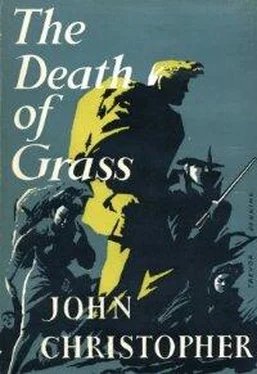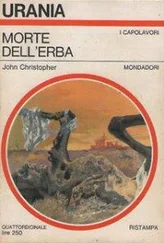Revolted, John said: “No!”
“When I spoke about murdering bastards,” Roger said, “I spoke with admiration as well as disgust. From now on, I propose to be one where necessary, and I very much hope you are prepared to do the same.”
“But to drop hydrogen bombs on cities—of one’s own people…”
“Yes, that’s what Welling wants time for. I should think it will take at least twenty-four hours—perhaps as long as forty-eight Don’t be a fool, Johnny! It’s not so long ago that one’s own people were the people in the same village. As a matter of fact, he can put a good cloak of generosity over the act.”
“Generosity? Hydrogen bombs?”
“They’re going to die. In England, at least thirty million people are going to die before the rest can scrape a living. Which way’s best—of starvation or being killed for your flesh—or by a hydrogen bomb? It’s quick, after all. And you can keep the numbers down to thirty million that way and preserve the fields to grow the crops to support the rest. That’s the theory of it.”
From another part of the public-house, light music came to them as the barmaid switched on a portable wireless. The ordinary world continued, untouched, untroubled.
“It can’t work,” John said.
“I’m inclined to agree,” said Roger. “I think the news will leak, and I think the cities will burst their seams before Welling has got his bomber fleet properly lined up. But I’m not under any illusion that things will be any better that way. At my guess, it means fifty million dying instead of thirty, and a far more barbarous and primitive existence for those that do survive. Who is going to have the power to protect the potato fields against the roaming mob? Who is going to save seed potatoes for next year? Wetting’s a swine, but a clear-sighted swine. After his fashion, he’s trying to save the country.”
“You think the news will get out?”
In his mind he visualized a panic-stricken London, with himself and Ann caught in it—unable to get to the children.
Roger grinned. “Worrying, isn’t it? It’s a funny thing, but I have an idea we shall worry less about London’s teeming millions once we’re away from them. And the sooner we get away, the better.”
John said: The children…”
“Mary at Beckenham, and Davey at that place in Hertfordshire. I’ve thought about that. We can get Davey on the way north. Your job is to go and pick Mary up. Right away. I’ll go and get word to Ann. She can pack essentials. Olivia and Steve and I will be at your place, with our car loaded. When you get there with Mary, we’ll load your car and get moving. If possible, we should be clear of London well before nightfall.”
“I suppose we must,” John said.
Roger followed his gaze round the interior of the bar—flowers in a polished copper urn, a calendar blowing in a small breeze, floors still damp from scrubbing.
“Say goodbye to it,” he said. “That’s yesterday’s world. From now on, we’re peasants, and lucky at that.”
Beckenham, Roger had told him, was included in the area to be sealed off. He was shown into the study of Miss Errington, the headmistress, and waited there for her. The room was neat, but still feminine. It was a combination, he remembered, that had impressed Ann, as Miss Errington herself had done. She was a very tall woman, with a gentle humorousness.
She bowed her head coming through the door, and said:
“Good afternoon, Mr Custance.” It was, John noted, just half an hour after noon. “I’m sorry to have kept you waiting.”
“I hope I haven’t brought you away from your luncheon?”
She smiled. “It is no hardship these days, Mr Custance. You’ve come about Mary?”
“Yes. I should like to take her back with me.”
Miss Errington said: “Do have a seat.” She looked at him, calmly considerate. “You want to take her away? Why?”
This was the moment that made him feel the bitter weight of his secret knowledge. He must give no warning of what was to happen; Roger had insisted on that, and he agreed. It was as essential to their plans as to Wetting’s larger scheme of destruction that no news should get out.
And that necessity required that he should leave this tall, gentle woman, along with her charges, to die.
He said lamely: “It’s a family matter. A relative, passing through London. You understand…”
“You see, Mr Custance, we try to keep breaks of this kind to a minimum. You will appreciate that it’s very unsettling. It’s rather different at week-ends.”
“Yes. I do see that. It’s her—uncle, and he’s going abroad by air this evening.”
“Really? For long?”
More glibly, he continued: “He may be gone for some years. He was very anxious to see Mary before he went.”
“You could have brought him here, of course.” Miss Errington hesitated. “When would you be bringing her back?”
“I could bring her back this evening.”
“Well, in that case… I’ll go and ask someone to get her.” She walked over to the door, and opened it. She called into the corridor: “Helena? Would you ask Mary Custance to come along here, please? Her father has come to see her.” To John, she said: “If it’s only for the afternoon, she won’t want her things, will she?”
“No,” he said, “it doesn’t matter about them.”
Miss Errington sat down again. “I should tell you I’m very pleased with your daughter, Mr Custance. At her age, girls divide out—one sees something of what they are going to turn into. Mary has been coming along very well lately. I believe she might have a very fine academic future, if she wished.”
Academic future, John thought—to hold a tiny oasis against a desert world.
He said: “That’s very gratifying.”
Miss Errington smiled. “Although, probably, the point is itself academic. One doubts if the young men of her acquaintance will permit her to settle into so barren a life.”
“I see nothing barren in it, Miss Errington. Your own must be very full.”
She laughed. “It has turned out better than I thought it would! I’m beginning to look forward to my retirement.”
Mary came in, curtseyed briefly to Miss Errington, and ran over to John.
“Daddy! What’s happened?”
Miss Errington said: “Your father wishes to take you away for a few hours. Your uncle is passing through London, on his way abroad, and would like to see you.”
“Uncle David? Abroad?”
John said quickly: “It’s quite unexpected. I’ll explain everything to you on the way. Are you ready to come as you are?”
“Yes, of course.”
“Then I shan’t keep you,” Miss Errington said. “Can you have her back for eight o’clock, Mr Custance?”
“I shall try my best.”
She held her long delicate hand out. “Good-bye.”
John hesitated; his mind rebelled against taking her hand and leaving her with no inkling of what lay ahead. And yet he dared not tell her; nor, he thought, would she believe him if he did.
He said: “If I fail to bring Mary back by eight, it will be because I have learned that the whole of London is to be swallowed up in an earthquake. So if we don’t come back, I advise you to round up the girls and take them out into the country. At whatever inconvenience.”
Miss Errington looked at him with mild astonishment that he should descend into such absurd and tasteless clowning. Mary also was watching him in surprise.
The headmistress said: “Well, yes, but of course you will be back by eight,”
He said, miserably: “Yes, of course.”
As the car pulled out of the school grounds, Mary said:
“It isn’t Uncle David, is it?”
“No.”
“What is it, then, Daddy?”
Читать дальше












